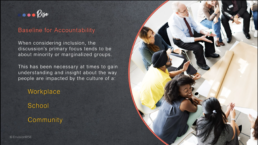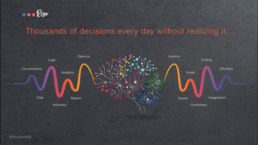The Workforce Beyond Boomers
The Workforce Beyond Baby Boomers
Staci Hegarty, M.Ed, VP of Equity and Inclusion
2030 is the year all Baby Boomers (born 1946-1964) will be at or above the traditional retirement age of 65. Although many Boomers work well past that age, there will be more open roles within organizations that cannot be filled by the next generation of workers. Combine this with the Great Resignation, employers are finding themselves in the difficult position of not being able to find enough qualified workers.
What Does the Future of the Workforce Look Like?
Organizations are not only losing the employee, they are also losing historical knowledge and the skillsets that come with time spent on the job. On average, Boomers are most likely to spend more years with the same employer than the other generations. The average Boomer has a workplace tenure of over eight years, with several studies indicating that nearly 40% have been with their employer for 20+ years. Gen X (born 1965-1979) averages about 5 years, while Millenials (born 1980-1994) and Gen Z (born 1995-2012) both average less than three years.
The younger generations are quick to leave an organization that does not value their time, talents, and insights, and with so many open roles, they are able to find new opportunities relatively quickly. Employee attrition can destroy a company by derailing the strategic plan, stifling innovation, and driving up costs related to human resources and recruiting. We are already in a hiring crisis and employers must take tangible and impactful action to retain and promote the workers they already have.
How Do We Support the Next Generations?
The old mindset of employee retention no longer works. A fair salary is an obvious requirement to attract a retain employees, but that alone will not be enough to prevent an employee from leaving. The culture of the company is the most important thing to workers. Job security, work/life balance, connections with coworkers and flexibility – in not only work schedule but in workplace (home versus in-office) – are the top four drivers of employee satisfaction. Organizational Change Management (OCM) in partnership with Diversity, Equity, and Inclusion (DE&I) work will allow companies to transform the existing workplace culture from “good enough for now” to dynamic, empowered, and innovative.
Envision RISE offers a comprehensive approach to help companies build a dynamic and empowered workplace culture that is prepared and adaptable. Through surveys, focus groups, executive alignment, and policy review, Envision RISE can help companies understand their employees’ sentiment, identify areas of improvement, and develop a roadmap for continual improvement. This approach is crucial for creating a workplace culture that not only retains employees but also drives innovation and growth.
Contact us to get started. Listen in to the most recent Envision RISE Podcast featuring Martine Kalaw, founder of Martine Kalaw Enterprises and author of “ABCs of Diversity,” as we discuss the generational changes actively happening and how they are reshaping the future of the workforce.

Unlocking Employee Retention: Strategies for the Challenging Labor Market
Unlocking Employee Retention: Strategies for the Challenging Labor Market
Staci Hegarty, M.Ed, VP of Equity and Inclusion
In the United States, a common complaint is that “no one wants to work,” even though we are currently experiencing a period of the lowest unemployment in the past 50 years. This, coupled with the fact that all Baby Boomers are rapidly reaching traditional retirement age by the year 2030, means we are in a difficult position of having more open roles than we have available workers.
In this environment, employee retention has become a top priority for companies, particularly amid “The Great Resignation.” Envision RISE course RISE-08 “Transparent Development and Retention Practices” states, “Healthy, high-performing organizations have the policies and procedures in place to uncover problems before it costs them high-potential employees. Once employees start resigning, the reputation of the company is at risk.”
Retaining Current Talent
Rather than competing for qualified candidates, organizations are taking steps to retain the ones they already have. The days of a steady paycheck being enough are long gone. Employees now seek fair and equitable pay, benefits that meet their needs, and a workplace culture that values what each person brings to the job, as well as inclusion and a sense of belonging.
Unfortunately, many employers dismiss these desires as passing fads or entitlement. However, research indicates that employees who feel a greater sense of belonging and inclusion at work report a significantly higher Employer Net Promoter Score (eNPS), which measures the likelihood that a current employee would recommend a company as a great place to work. This metric can provide insights into company culture, predict turnover, and gauge overall employee engagement.
How to Measure Inclusion and Belonging
Here are a few ways to start measuring inclusion and belonging at your organization:
- Start by examining who is in your workforce. Who gets hired and who stays?
- Provide thoughtful exit interviews. What do they tell you?
- Consider using “Stay Interviews.” Stay Interviews identify trends that could be contributing to employee turnover. By prioritizing employee retention and cultivating an inclusive workplace culture, companies can thrive in this challenging labor market.
Overall, companies must invest in employee retention if they want to remain competitive and profitable. A steady paycheck may have been enough in the past, but today’s employees seek much more than that. Fair pay, appropriate benefits, and inclusive workplace culture are essential components to successful employee retention. Ultimately, it’s up to employers to earn the loyalty of their current employees by creating a work environment that meets employee expectations and shares in the companies’ successes. Ensuring that all employees feel valued, respected, and part of a greater whole will help any organization stay competitive. For guidance on how best to meet these goals, contact Envision RISE for employee retention services and strategies tailored to your needs.



